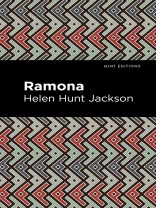Ramona (1884) is a novel by Helen Hunt Jackson. Inspired by her activism for the rights of Native Americans, Ramona is a story of racial discrimination, survival, and history set in California in the aftermath of the Mexican American War. Immensely popular upon publication, Ramona earned favorable comparisons to Harriet Beecher Stowe’s Uncle Tom’s Cabin and remains an influential sentimental novel to this day. Orphaned after the death of her foster mother, Ramona, a Scottish-Native American girl, is taken in by her reluctant foster aunt Señora Gonzaga Moreno. Early on, she experiences discrimination due to her mixed heritage and troubled upbringing, but Gonzaga Moreno begrudgingly provides for her as though she were her own daughter, in accordance with her sister’s wishes. When a group of Native American migrant workers arrives from Temecula to perform the annual sheep shearing, Ramona falls in love with Alessandro, a pious Catholic. Despite his honesty and capacity for hard work, Alessandro is viewed with contempt by the Señora. Faced with no alternative, the lovers elope and make their way toward the San Bernardino Mountains, facing racism and violence from American settlers along the way. Bound by love, rejected by the dominant cultures of the newly Americanized California, Alessandro and Ramona must do what they can to survive. This edition of Helen Hunt Jackson’s Ramona is a classic of American literature reimagined for modern readers.
Since our inception in 2020, Mint Editions has kept sustainability and innovation at the forefront of our mission. Each and every Mint Edition title gets a fresh, professionally typeset manuscript and a dazzling new cover, all while maintaining the integrity of the original book.
With thousands of titles in our collection, we aim to spotlight diverse public domain works to help them find modern audiences. Mint Editions celebrates a breadth of literary works, curated from both canonical and overlooked classics from writers around the globe.
लेखक के बारे में
Helen Hunt Jackson (1830-1885) was an American poet and activist. Born Helen Maria Fiske in Amherst, Massachusetts, she was raised in a unitarian family alongside a sister, Anne. By seventeen years of age, she had lost both of her parents and was taken in by an uncle. Educated at Ipswich Female Seminar and the Abbott Institute, she was a classmate and friend of Emily Dickinson. At 22, she married Captain Edward Bissell Hunt, with whom she had two sons. Following the deaths of her children and husband, Hunt Jackson dedicated herself to poetry and moved to Newport in 1866. “Coronation” appeared in The Atlantic in 1869, launching Hunt Jackson’s career and helping her find publication in The Century, The Nation, and Independent. Following several years in Europe, she visited California and developed a fascination with the American West. After contracting tuberculosis, she stayed at Seven Falls, a treatment center in Colorado Springs, where she met her second husband William Sharpless Jackson. Praised early on for her elegiac verses by such figures as Ralph Waldo Emerson, Hunt Jackson turned her attention to the plight of Native Americans in 1879 following a lecture in Boston by Ponca chief Standing Bear. She began to lobby government officials by mail and in person, launching and publishing her own investigations of systemic abuse in the New York Independent, Century Magazine, and the Daily Tribune. In 1881, she published A Century of Dishonor, a history of seven tribes who faced oppression, displacement, and genocide under American expansion. She sent her book to every member of Congress and continued to work as an activist and writer until her death from stomach cancer. Ramona (1884), a political novel, was described upon publication in the North American Review as “unquestionably the best novel yet produced by an American woman.”












